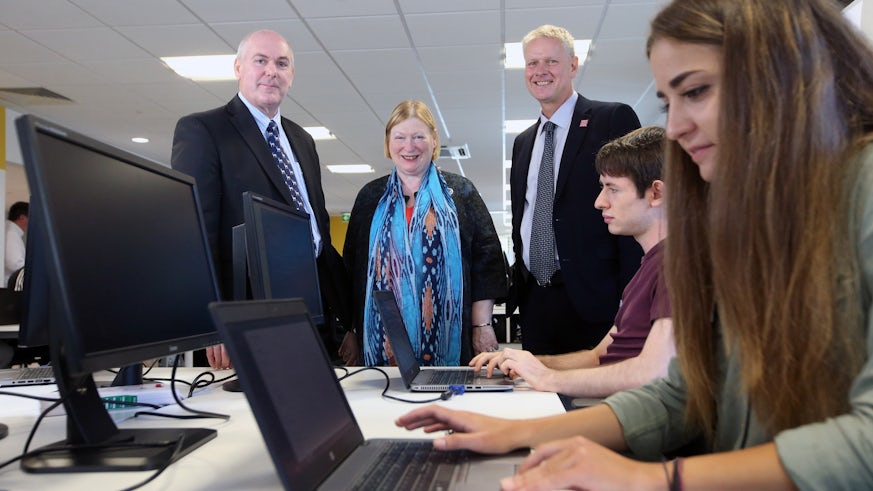University launches ‘National Software Academy’
12 October 2015

New software engineering degree programme will equip graduates with “on the job” experience required by employers
A ‘National Software Academy’, set up to train and educate the next generation of software engineers in Wales, has been launched today by the University and Welsh Government.
Run in partnership with the Alacrity Foundation in Newport, the three-year degree programme (BSc Applied Software Engineering) has been set up by the School of Computer Science & Informatics to address the current unmet demand for skilled software engineers in Wales.
The degree, which will be delivered at ‘Platfform’, home of the Welsh Government’s new digital innovation company in Newport, will also form a key part of the Welsh Government’s initiative to regenerate Newport by providing strong links with industry and to the wider Cardiff region.
Economy, Science and Transport Minister, Edwina Hart, said: “Science, Technology, Engineering and Mathematics skills are vitally important to the Welsh economy and this programme fully supports our vision of attracting and building capability in this area.
“We are a pro-business government, committed to working with the sector to find practical solutions to Wales’ economic needs. I am delighted we are launching the National Software Academy because it will ensure that our graduates entering this highly specialist profession have the right skills and training to hit the ground running.”
Market research undertaken by Welsh Government predicts that industries in Wales demand 3,100 IT professionals each year. The supply of skilled graduates from universities is low, which means the demand is currently not being met.
Wales is not alone in trying to plug this skills gap: in the US, for example, there is an annual demand for 125,000 skilled software engineering graduates, with only 45,000 graduates being supplied by universities.
Furthermore, software engineering graduates are perceived by industry to be lacking in a number of essential skills to make them ready for the workplace once they leave university.
To tackle these issues, students enrolled onto the ‘National Software Academy’ will work on “real life” projects throughout their studies under the mentorship of experienced software engineers from industry.
Professor Karen Holford, Pro Vice-Chancellor, College of Physical Sciences and Engineering, said: “When we talk to our partners in business and industry they tell us that they need more graduates leaving university with the right skills for the 21st century workplace. They need graduates with more ‘on the job’ experience and interaction with businesses throughout their studies.
“The National Software Academy will address these issues, and provide our students with a distinctive educational experience that ensures they stand out from the crowd. Students will graduate as highly employable leaders in their field, with the vocational edge needed in today’s workplace.”
Professor Simon Gibson, Chairman of the Alacrity Foundation, stated: “From our experience, it became clear that the academic community urgently needed to produce a new curriculum with a much tighter awareness of the needs of employers.
“Through a strong partnership with Cardiff University, the Alacrity Foundation has assisted in creating a course aligned with the enormous opportunities that continue to emerge from the world of computing and networking. The reaction of industry and potential students, coupled with the success of the pilot year, endorses the decision to innovate in the teaching of software engineering. We applaud Cardiff University for having the foresight to create the National Software Academy.”